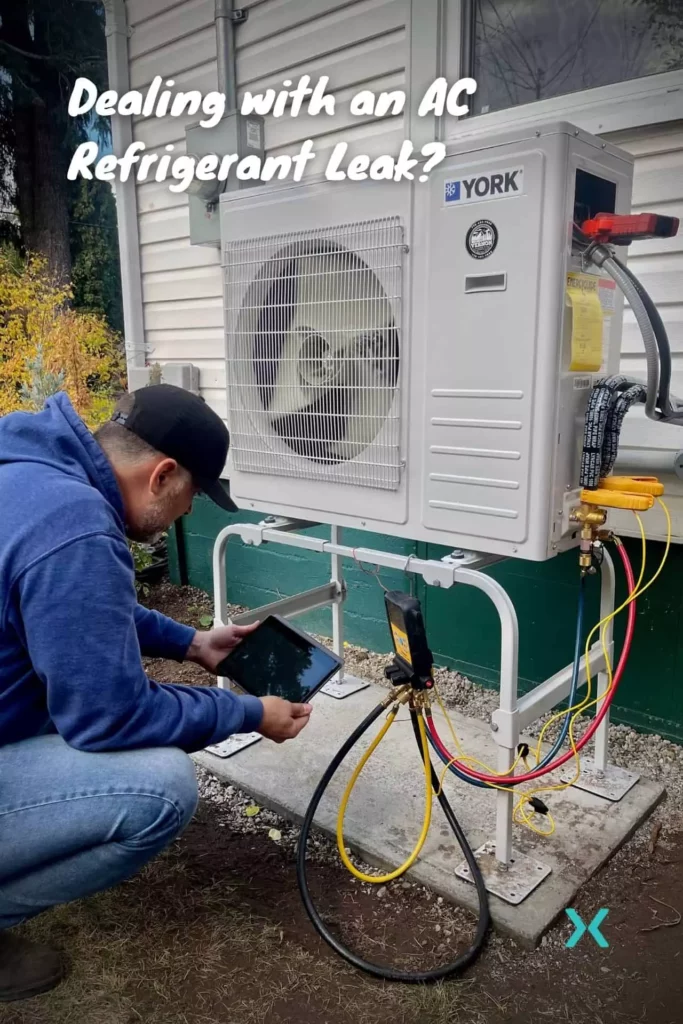❄️ What is AC Refrigerant?
Refrigerant liquid (sometimes called freon or coolant gas) is a chemical compound that’s used within an air conditioning system.
The refrigerant’s job during the cooling process is to absorb heat from the inside air in your home and transfer it to the outdoor unit, where the heat is dumped into the outside environment.
Whether you have central air conditioning, ductless air conditioning, portable AC or a heat pump, they all use refrigerant to cool down your home.
If you have low refrigerant due to a refrigerant leak, your HVAC equipment will display certain symptoms.
These problems will manifest as the issues listed below.
So if you suspect a coolant leak, keep reading to learn more about what causes it, the signs that you have an refrigerant leak, and what you can do about it.
Table of Contents
⭐ Top Causes of Air Conditioner Refrigerant Leaks
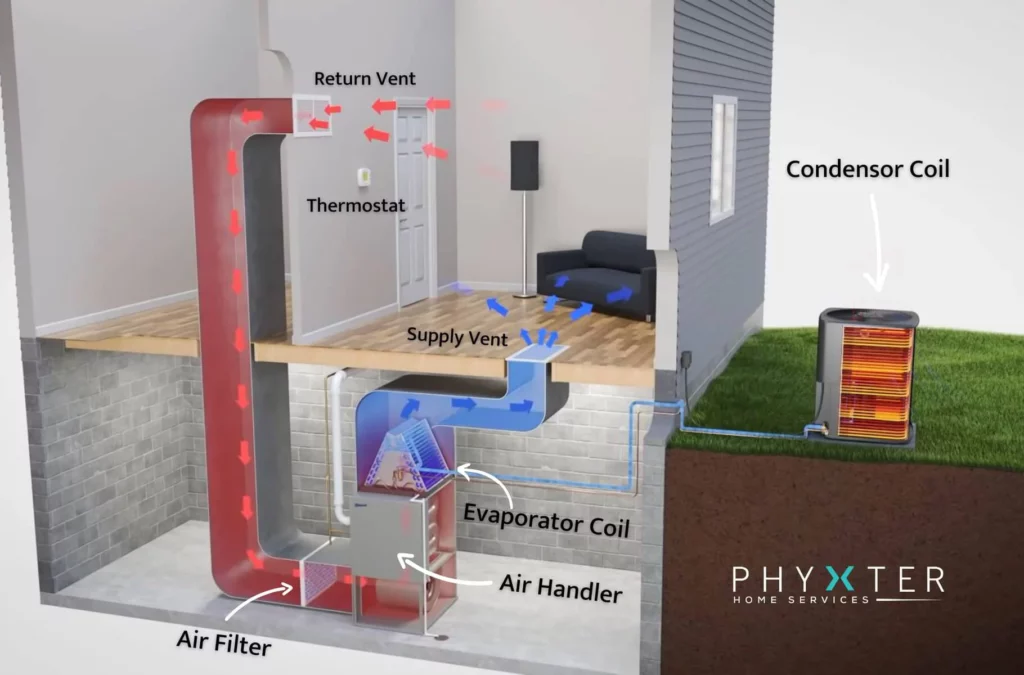
There are many reasons behind a refrigerant leak. Some are obvious, some not so much.
Refrigerant is contained within a closed system, so if your refrigerant is low, it’s due to an AC leak somewhere in the HVAC unit.
Some of the most common causes are:
🛠️ Wear and Tear:
Over time, like all components or equipment, your AC will age due to wear and tear.
All of the moving parts, electrical and metal components, rubber seals and other connections will deteriorate over time, causing refrigerant leaks.
When regular maintenance gets ignored every season, you can expect problems to arise sooner rather than later.
🛠️ Metal Corrosion:
Once metal starts to corrode, your AC coils will develop champagne leaks or a pinhole leak.
These small holes normally occur in older AC units due to degradation over time.
Chemicals introduced into your home, such as paints, glues, air fresheners etc., can release volatile organic compounds into your indoor air.
These VOCs release formic acid that attacks and corrodes the copper tube walls on the copper pipes that hold the refrigerant.
Due to the formic acid corroding copper coils and pipes, many manufacturers are switching to aluminum coils.
🛠️ Vibrations:
Your AC is a well-oiled piece of complex machinery that requires all its components to work in unison to efficiently keep your home cool.
When this doesn’t happen, such as from an improper installation, components like your AC compressor can suffer from vibrations and lead to failure.
When this happens, joints and connections can weaken, causing your refrigerant to leak out.
🛠️ Physical Damage:
Physical damage can occur from improper installation or placement.
Your AC is also susceptible to human movement depending on the AC’s location.
Kids and animals can cause damage from outdoor play and lawnmowers throwing up debris.
All of which can cause considerable damage to your AC system.
🛠️ Factory Defects:
Not all air conditioning systems are created equal.
Opting for a cheaper system may work fine in the short term but will be susceptible to wear and tear faster than a higher quality and more expensive air conditioning unit.
❄️ 11 Signs you have an HVAC Refrigerant Leak
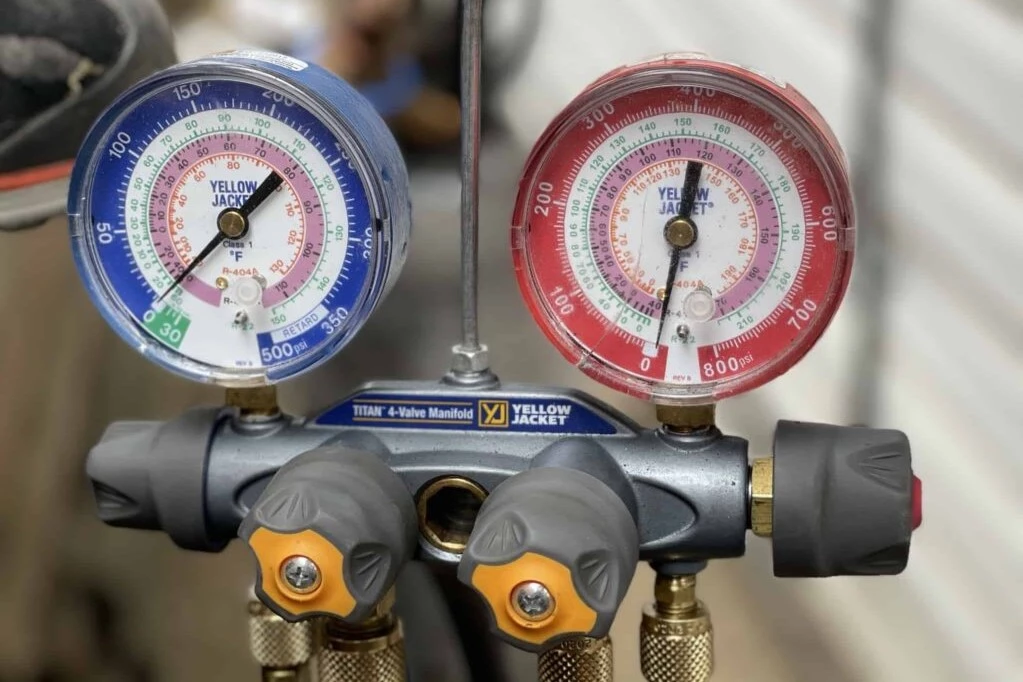
AC not working as well as it used to?
An air conditioning system that’s not cooling the way it should may suffer from a refrigerant leak.
But what does that look like?
Here are the top signs you may have an AC refrigerant leak.
❄️ Decreased Cooling Power
If your AC suffers from low refrigerant levels, the heat transfer your AC is designed to do will not happen efficiently.
If your AC system suddenly lacks the performance you have come to expect from your AC, maybe a refrigerant leak is to blame.
❄️ AC Not Blowing Cool Air
If your AC is not blowing cool air and all you can feel out of your registers is warm air, and you have checked all the other problems associated with refrigerant leaks, you probably have a freon leak.
Check out the following resource to learn more about your AC not blowing cold air.
❄️ Long Cooling Cycles
When your AC is low on refrigerant, it will have a harder time reaching the desired temperature you set on your thermostat.
As a result, your AC will have to run longer than usual to achieve the set temperature.
❄️ Reduced Air Flow
If your vents are blowing cold air, but the airflow is weak, your air conditioning unit might be leaking freon. Put your hand in front of your AC registers while your AC is on to check.
❄️ Higher Than Usual Electricity Bills
As you have already figured out, an air conditioner that leaks refrigerant has to work harder to cool down your home effectively.
This hard work will translate into a higher electric bill.
So if your bills are suddenly skyrocketing and not based on the change in consumption, you may suffer from freon leaks.
❄️ Frozen Evaporator Coils
If your HVAC system is leaking refrigerant, your indoor coil cannot adequately absorb heat.
This will quickly lead to a frozen evaporator coil.
When this happens, condensation on the refrigerant coil will freeze.
Ice on an evaporator coil indicates that your cooling system has coolant leaks.
❄️ AC Leaking Water
The frozen condensation we just discussed has to go somewhere when your AC stops running.
Your AC drainage system is not designed to drain away massive amounts of water caused by a thawing evaporator coil.
Since it’s hard to see your evaporator coil hiding away in your indoor air handler, water pooling around the base of your air conditioner is a clear sign of a low refrigerant.
❄️ Increased Humidity
Dehumidification is a designed result of an AC systems refrigeration process.
During a proper cooling cycle, humidity in the air will condense on the cooling coil and be drained away by the condensate drain line.
AC freon leaks can mess with this cycle, causing your home to feel more humid.
❄️ Bubbling or Hissing Sounds
Refrigerant leaks result from small holes or cracks in your coils or AC refrigerant lines.
The refrigerant will produce a hissing sound when a leak occurs due to its high pressure within the system.
If the hole is large enough, you may even hear a bubbling or gurgling sound coming from your AC unit.
❄️ Tiny Bubbles in the Evaporator Coil
If you have a small leak on your evaporator coils, you will notice tiny bubbles gathering around the source of the leak.
These are sometimes known as ‘champagne leaks.’
❄️ A Sweet or Chloroform-Like Smell
AC refrigerant has a sweet smell, like the coolant in your car.
So if you suspect any weird smells emanating from your AC, then a deeper inspection is required to ascertain the issue.
🛑 NOTE: The refrigerant used in air conditioning is toxic, so if you suspect a leak inside your home, it’s time to call out a professional HVAC company.
❄️ Dealing with AC Refrigerant Leaks
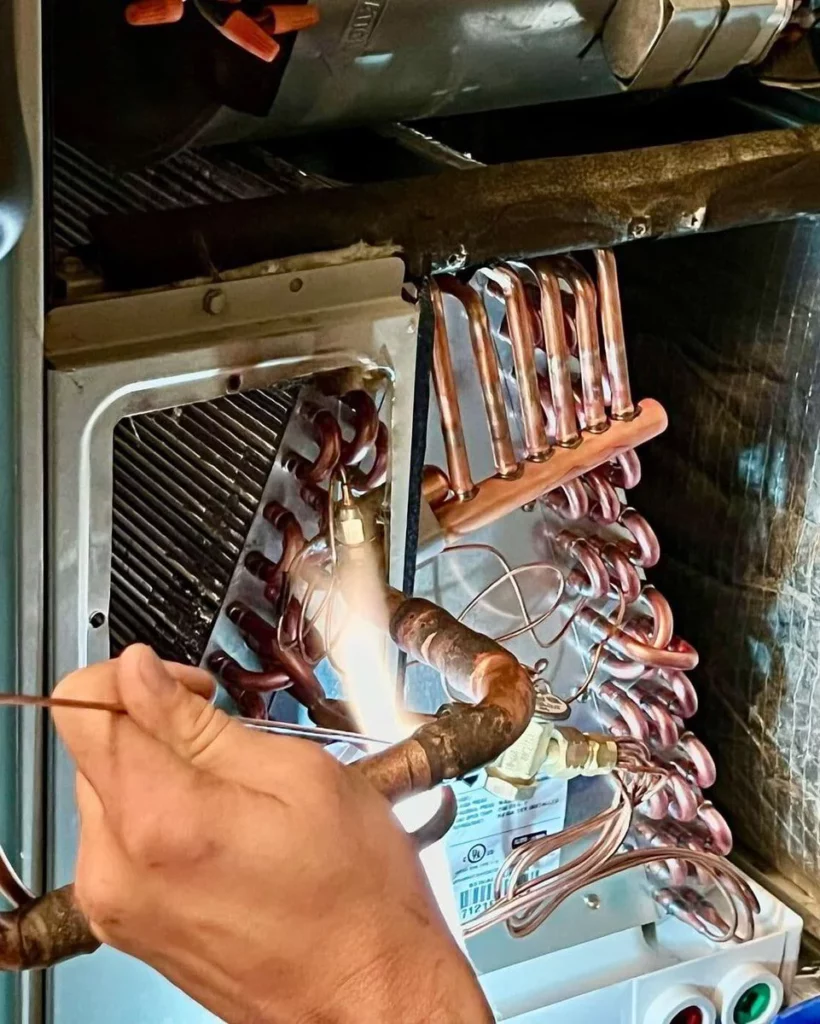
As discussed, refrigerant is contained within your AC in a closed system.
Knowing what to look for and adequately dealing with a leak can be expensive, so this is one task best left to the professionals.
You can’t just add more refrigerant, so be wary of any contractor proposing a quick top-off without repairing holes in your AC.
✅ PRO TIP: Refrigerant is toxic and is illegal to vent into the atmosphere, so don’t do it!
So this is one job we recommend calling a reputable HVAC professional in your area for.
❄️ Preventing Refrigerant Leaks
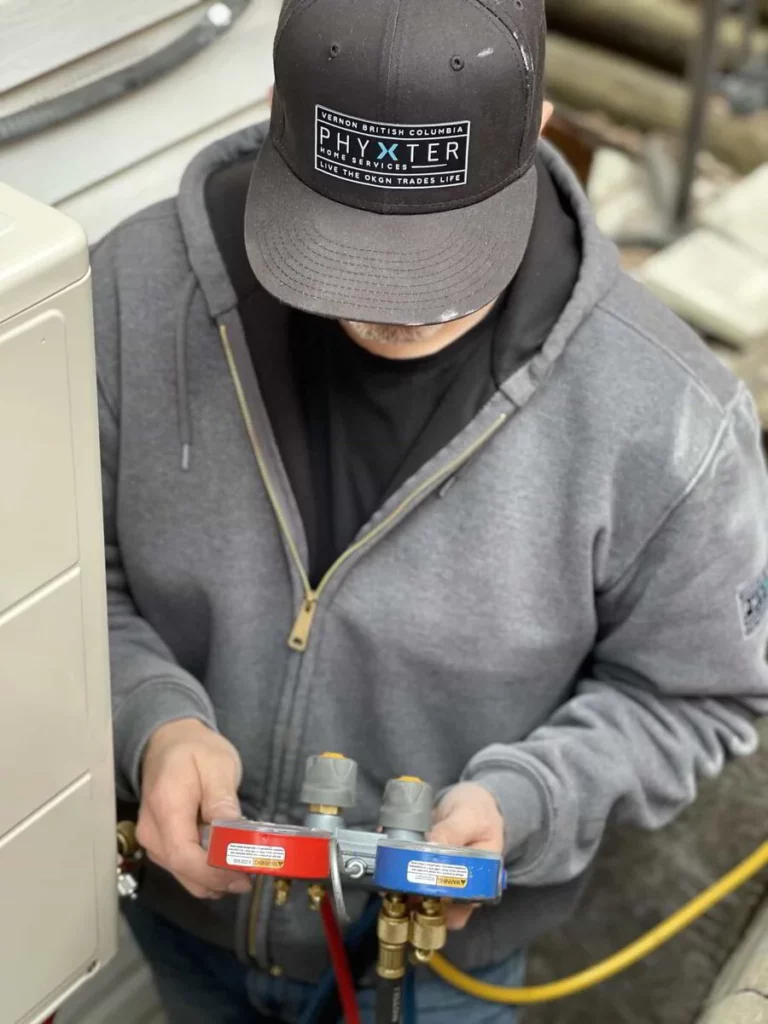
Dealing with an air conditioner refrigerant leak can be time-consuming and expensive if you don’t know what to look for.
While refrigerant leaks can quickly occur due to all the reasons we listed above, the average homeowner can take many steps to stop this from happening in the first place.
Scheduling regular maintenance can help in reducing problems that take time to occur.
Keeping your AC clean and out of harm’s way is the first step to maintaining an efficient air conditioning system.
Since after reading this, you are now a refrigerant leak expert.
You should now be able to quickly identify the symptoms of a leaking HVAC system and know how to articulate your AC problems to an HVAC technician correctly.
⭐ Finally!

Staying on top of any issues that may arise will keep your home comfortable for longer and reduce the impact on your finances.
Don’t let a minor problem turn into a more significant, expensive one.
If you live in the North or Central Okanagan region and suspect an AC refrigerant leak, call the HVAC experts from Phyxter Home Services.
We have the AC repair experts you are looking for; we are only a phone call away.
Want to learn more about your home’s HVAC system? Check out our other AC articles!

